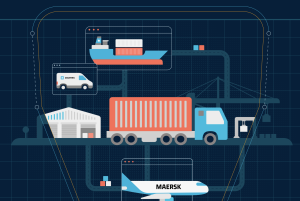 In Part 2 of her article on fragmentation of African supply chains, Adenike Onasoga, Head of Supply Chain at Kimberly-Clark, Nigeria, says regional integration in Africa has come a long way through social advancement, political stability and economic expansion throughout the continent. However, more needs to be done to actualise the set goals, which she writes about here.
In Part 2 of her article on fragmentation of African supply chains, Adenike Onasoga, Head of Supply Chain at Kimberly-Clark, Nigeria, says regional integration in Africa has come a long way through social advancement, political stability and economic expansion throughout the continent. However, more needs to be done to actualise the set goals, which she writes about here.
Improved Infrastructure
Enhancing transportation networks, logistics infrastructure and border facilities is crucial to facilitating the seamless movement of goods within and across regions. According to the World Bank, improving infrastructure in Africa could reduce trade costs by up to 30% and significantly enhance supply chain efficiency.
Policy Harmonisation
Streamlining regulations, customs procedures and trade policies among countries is essential
to reduce barriers and promote regional trade. To ensure effective supply chains, it is crucial to prioritise trade, debt and climate actions while implementing diverse trading approaches, robust checks and balances and stringent national security measures. This comprehensive and
coordinated policy execution will maximise trade opportunities, address debt concerns, mitigate climate risks and enhance overall supply chain efficiency.
The significance of SMEs and MSMEs in the success of regional agreements
SMEs and MSMEs play a vital role in driving the success of African Regional Agreements. These agreements have emerged as a key strategy to foster integration, boost economic growth, and enhance competitiveness across the continent, while addressing fragmentation of supply chains. Within this context, small and medium enterprises (SMEs) and micro, small, and medium enterprises (MSMEs) play a pivotal role in driving the success of these agreements. Their contributions span various aspects, from enhancing intra-African trade to fostering innovation and inclusive growth. This article explores the significant impact of SMEs and MSMEs in driving the success of African regional agreements, supported by relevant data.
- Enhanced Intra-African Trade: SMEs and MSMEs are instrumental in promoting intra-African trade, contributing to the growth of regional economies. According to the African Union, intra-African trade has been steadily increasing, reaching 17% of the continent’s total trade in 2020. SMEs and MSMEs are major players in this upward trend, accounting for a substantial portion of trade activities within regional markets.
Data from the International Trade Centre (ITC) highlights the importance of SMEs and MSMEs in intra-African trade. SMEs now account for circa 90% of businesses in Africa and contribute significantly to regional exports and imports.
Their participation in regional agreements allows them to expand their market reach, access new customers and contribute to the growth of regional trade volumes.
- Job Creation and Economic Growth: SMEs and MSMEs are renowned for their role in job creation and economic growth. The African Development Bank reports that SMEs constitute around 90% of businesses in Africa and account for approximately 80% of the region’s employment. Their active participation in regional agreements leads to increased business opportunities, market expansion and job creation across the continent. Data from the United Nations Economic Commission for Africa (UNECA) indicates that SMEs and MSMEs have the potential to create millions of jobs in Africa. For instance, the African Continental Free Trade Area (AfCFTA) agreement is expected to generate around 3.4 million jobs by 2025, with SMEs playing a significant role in this job creation process.
- Supply Chain Integration: SMEs and MSMEs play a crucial role in supply chain integration within the framework of regional agreements. As suppliers, subcontractors and service providers, they contribute to the development of regional value chains. By participating in regional agreements, SMEs and MSMEs gain access to larger enterprises, collaborate on joint projects and become an integral part of regional supply chains.
Research conducted by the United Nations Industrial Development Organization (UNIDO) indicates that SMEs and MSMEs in Africa actively engage in cross-border trade within regional value chains. Their participation in these value chains fosters collaboration, technology transfer and knowledge sharing, resulting in improved competitiveness and increased resilience in regional supply chains.
- Innovation and Adaptability: SMEs and MSMEs are known for their innovative capacity and adaptability to market demands. Their involvement in regional agreements stimulates innovation as they strive to meet the requirements of regional markets and comply with harmonised standards. Through innovation, they contribute to the overall competitiveness of regional supply chains.
According to the World Bank, SMEs in Africa are more likely to introduce product or process innovations compared to larger firms. Their ability to adopt new technologies, respond quickly to market changes, and offer customised solutions enhances their competitiveness and drives the success of regional agreements.
- Local Development and Inclusive Growth: SMEs and MSMEs have strong connections to local communities and contribute to local economic development. Their inclusion in regional agreements ensures that the benefits of these agreements ensure a more efficient and interconnected supply chain within Africa.
To unlock the full potential of SMEs and MSMEs in driving the success of regional agreements, it is important to address the challenges they face, such as limited access to finance, capacity constraints, regulatory burdens and infrastructure deficiencies. Providing targeted support, including access to
finance, business development services and technical assistance, can empower SMEs and MSMEs to effectively participate in regional supply chains and maximise the benefits of regional agreements.



























